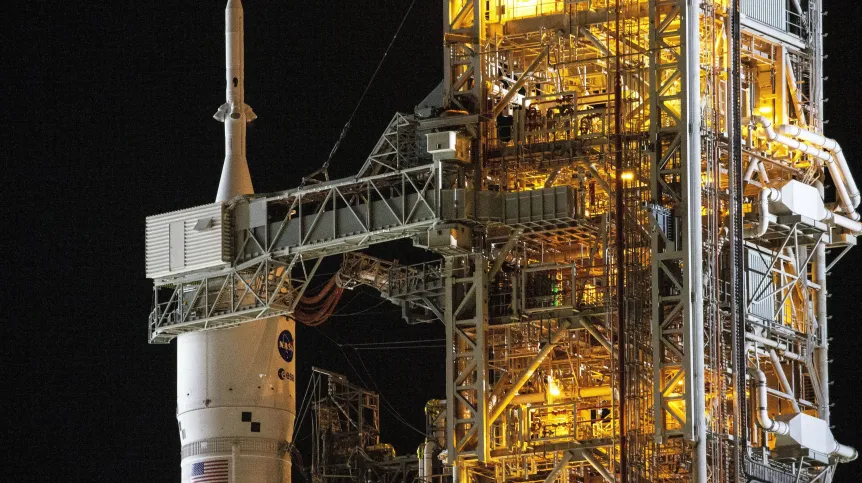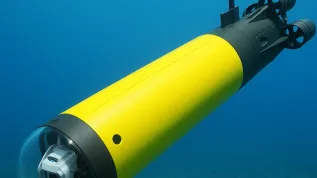
A breakthrough in research on obtaining energy from nuclear fusion, the release of images from the James Webb Space Telescope, the launch of the space mission Artemis, in which Poles also participated, the discovery of Endurance - the ship of Antarctic explorer Ernest Shackleton, new findings concerning COVID-19, selection of a Polish researcher to join ESA Astronaut Reserve - these are some of the important scientific events of 2022.
JANUARY
10.01 - Eight scientists working in Polish research centres are among the 397 winners of 2021 Starting Grants - prestigious grants awarded by the European Research Council (ERC). This is a record edition for Poland.
11.01 - Researchers from the Medical University of Bialystok announced that they had identified a genetic variant that predisposes to a severe course of COVID-19, more than doubles the risk of such a course of this disease and the death of the patient. The discovery was made during the work on the project co-financed by the Medical Research Agency, in cooperation with the Institute of Lung Diseases and Tuberculosis in Warsaw and the tech company ImageneMe. Several clinical centres in Poland were also involved in the study.
11.01 - American surgeons from the University of Maryland Medical Center were the first to successfully implant a heart from a genetically modified pig in a human patient. It was the last attempt to save the life of 57 years old David Bennett.
19.01 - NASA announced that the Curiosity rover on Mars came across a specific mix of carbon isotopes - the kind that is associated with the presence of biological processes on Earth. The research results are presented in a papaer published in the scientific journal Proceedings of the National Academy of Sciences of the United States of America.
FEBRUARY
2.02 - Asteroid 2020 XL5 is an Earth trojan, an asteroid accompanying the Earth and having an orbit similar to Earth's, as confirmed by international research in which scientists from the Adam Mickiewicz University in Poznań participated. It is the largest known Earth trojan. The discovery was announced by the Poznań university.
9.02 - Scientists from the European consortium EUROfusion, in which Polish researchers also participate, produced a stable plasma, obtaining 59 megajoules of energy in the world's largest nuclear fusion facility - the JET tokamak in the UK. This is an important step towards the practical use of fusion.
10.02 - The discovery of the third planet in the Proxima Centauri system, which is the closest on to the Solar System, was announced by an international team of astronomers and the European Southern Observatory. Proxima Centauri is the star closest to the Sun. It is 4.24 light years away from us. It has been known since 1915.
February 16 - An American woman became the third person in the world to be freed from HIV. This was done with a cord blood transplant. The previous two patients were cured of this infection after a bone marrow transplant.
February 25 - Scientists published a new map of the cosmos, based on observations with the LOFAR radio telescope. The map includes over 4.4 million objects, including many previously unknown ones. The authors of the work include a group of Polish astronomers.
MARCH
5.03 - A healthy, balanced diet may be an effective means of reducing the risk of developing COVID-19 in healthy, physically active and non-obese young people, researchers from the Jagiellonian University Medical College showed. The effectiveness of a diet rich in vegetables and fruits, with a suitable amount of garlic, nuts, whole grain products and legumes, in protecting against the coronavirus disease can reach 80 percent.
8.03 - David Bennett, the first human to receive a genetically modified pig's heart transplant two months earlier, died at 57.
9.03 - 25 DNA regions associated with severe course of COVID-19 were identified, including as many as 16 previously unknown ones. The study published in Nature included 7,491 critically ill patients and 48,400 controls whose genomes were analysed in the GenOMICC project. This is the largest study of its kind, using the most accurate and comprehensive DNA analysis technology - WGS (Whole Genome Sequencing).
9.03 - Endurance is found - the ship of the famous Antarctic explorer Ernest Shackleton. The vessel sank under the ice in 1915. The wreck, resting at a depth of 3 km, has been preserved in surprisingly good condition.
11.03 - Polish astronomer, Professor Bożena Czerny from the Center for Theoretical Physics of the Polish Academy of Sciences, received the Lodewijk Woltjer Lecture Award for astronomers of outstanding scientific distinction from the European Astronomical Society (EAS). She was the first Polish woman to receive this award, which had been awarded since 2010.
17.03 - Scientists discovered and described a previously unknown species of parasite that lives... in the nose of the European bison. The authors of the discovery, researchers from the University of Gdańsk and the Warsaw University of Life Sciences, point out that research on parasitofauna associated with an endangered species is of particular importance. Their paper was published in the International Journal for Parasitology: Parasites and Wildlife
24.03 - Dennis P. Sullivan (81), Albert Einstein Chair in the Sciences at The Graduate Center, was named a winner of a Abel Prize, considered by many to be the mathematical equivalent of the Nobel Prize, the Norwegian Academy of Science and Letters announced.
APRIL
7.04 - An international team of astronomers including Polish researchers published the most accurate to date map of the Universe in the low radio frequency range. The new sky survey allowed to explore tens of thousands of galaxies - all the way to the far reaches of the Universe. The European network of LOFAR radio telescopes, with three stations located in Poland, was used for the observations.
19.04 - The US space agency NASA announced that the Martian drone Ingenuity took to the air and performed the first-ever controlled and powered flight in the atmosphere of another planet. The small helicopter took off without any problems.
22.04 - Scientists from 13 countries, including four Polish researchers from the West Pomeranian University of Technology in Szczecin, decoded the genome of rye. The discovery will enable improvement of other crops.
MAY
15.05 - The Chinese probe Tianwen-1 with the rover Zhurong successfully landed on Mars, Chinese state media reported. This is the first fully Chinese unmanned mission to the Red Planet. Before that, only the United States had managed to place its probe on the surface of Mars.
17.05 - An international group of specialists in the prestigious journal Science called for an investigation into the origin of SARS-CoV-2, responsible for the coronavirus epidemic. According to the scientists, both possibilities remain to be explained - the jump from animals to humans and escape from the laboratory.
JUNE
2.06 - A team from Zurich (Switzerland) had performed the world's first surgery to implant a previously destroyed liver. A special device regenerated the organ outside the body within three days. A year had passed since the surgery and the patient, treated for cancer, felt good. The organ that had previously been destroyed and unsuitable for transplantation was regenerated outside the body to such an extent that it could be placed in the recipient's body. This was possible thanks to the original device, which replaced the body for three days. Previously, a liver could only be stored outside the body for 12 hours.
10.06 - Two international teams of scientists, including astronomers from the Astronomical Observatory of the University of Warsaw, announced the discovery of a lonely black hole in the Milky Way. It was the first detection of this type.
13.06 - Scientists released a data cache from the Gaia mission, including information for 1.8 billion stars in the Milky Way, data on 'starquakes', 'stellar DNA' - ESA and the Astronomical Observatory of the University of Warsaw reported. Polish scientists participate in the research project.
21.06 - New research identified over 1,000 genes associated with severe COVID-19. The results were reported by the journal Cell Systems.
JULY
5.07 - Hugo Duminil-Copin from France, Korean-American mathematician June Huh, James Maynard from the UK and Maryna Wiazowska from Ukraine received the Fields Medal, awarded for achievements in mathematics.
8.07 - Polish scientific communication expert Dr. Tomasz Rożek became a member of the European Space Agency (ESA) advisory group as the only representative of Poland and the countries of our region. He will work on determining the direction of space technology development in Europe.
12.07 - NASA and US President Joe Biden jointly presented the first historic image from the James Webb Space Telescope at the White House. According to NASA, 'it’s the deepest and sharpest infrared image of the distant universe, so far'. Several hours later, more images and scientific data were released.
13.07 - The Management Board of the European Space Agency decided to end cooperation with the Russian space agency Roscosmos on the ExoMars-2022 mission, aimed at exploring Mars.
29.07 - Suspicions surfaced of fabrication of the results on which many important studies on Alzheimer's disease had been based, according to an investigation conducted by Science. Basic assumptions about the origin of the disease were questioned. The journal's six-month investigation indicates that the key results, on which numerous, decades-long Alzheimer's research projects are based, may have been falsified, according to an article by Charles Piller
AUGUST
3.08 - The AI-based AlphaFold system presented the 3S structure of almost all two hundred million proteins known to biologists. Almost everything that happens in cells depends on these molecules, the structure of which is encoded by genes.
4.08 - In the journal Nature, scientists from the Wellcome Sanger Institute (UK), ETH Zurich (Switzerland) and other centres presented a precise network of dependencies between various elements of the immune system. This knowledge could lead to new therapies for cancer, infectious diseases and other conditions.
4.08 - With the help of a special liquid, researchers from Yale (US) brought back to life some cells and organs of a pig that had been dead for an hour. A similar technique could help store organs for transplants or save people after strokes or heart attacks.
10.08 - Several thousand years old traces of the activity of a group of Alpine ibex hunters were discovered by a Slovak-Polish research expedition in Hučivá Cave (Hučivá diera) in the Belianske Tatras in Slovakia. It is the only site discovered so far in the Tatras with traces of Palaeolithic settlement.
SEPTEMBER
23.09 - Winners of the Breakthrough Prize announced. They include creators of the AI system that predicts the structure of proteins, the authors of the discovery concerning the origin of narcolepsy, research on quantum computers and widely used mathematical algorithms. The Breakthrough Prize, awarded to outstanding scientists, was established in 2012 by the Russian-Israeli physicist and entrepreneur Yuri Milner and sponsored by well-known businessmen, including Mark Zuckerberg and Sergey Brin.
27.09 - The NASA probe collided as planned with the asteroid Dimorphos as part of the DART mission - the first planetary defence test in history. The mission was designed to check the extent to which an impact would change the trajectory of a small celestial body. The collision of the probe the size of a small car with a space rock with a diameter of approx. 160 m took place approx. 11 million kilometres from Earth.
OCTOBER
3.10 - The Nobel Prize in Physiology and Medicine was awarded to the scientist who sequenced the Neanderthal genome and learned the secrets of the evolution of our species - Svante Pääbo 'for his discoveries concerning the genomes of extinct hominins and human evolution', the Nobel Committee justified.
4.10 - The Nobel Prize in Physics was awarded to: Alain Aspect (France), John F. Clauser (USA) and Anton Zeilinger (Austria). They conducted groundbreaking experiments using entangled quantum states, where two particles behave as a single entity even when separated. The results paved the way for a new technology based on quantum information.
5.10 - The Nobel Prize in Chemistry was awarded to: Carolyn R. Bertozzi (USA), Morten Meldal (Denmark) and Karl Barry Sharpless (USA) 'for the development of click chemistry and bioorthogonal chemistry', which involve simple, quick chemical reactions that can occur within living organisms without disrupting normal biological functions.
12.10 - Data analysis indicates that the impact of the DART probe on the asteroid Dimorphos changed the orbit of the object, NASA announced. It was a test of planetary defence against potential future asteroid threats.
20.10 - A family of Neanderthals was identified for the first time. This was possible with genetic testing of bone samples taken from a cave in Siberia, scientists reported in the Nature. The research was conducted by a team from the Max Planck Institute for Evolutionary Anthropology (Germany).
20.10 - Professor Marek Konarzewski was elected President of the Polish Academy of Sciences by the members of the General Assembly of the Polish Academy of Sciences in Warsaw. Professor Marek Konarzewski will hold the position for four years, until 2026. He replaces Professor Jerzy Duszyński.
27.10 - A Danish-Swedish team developed a chip that transmits information at a speed of almost 2 petabits per second (2 Pbit/s) - twice as fast as the entire Internet data transfer. Scientists are already planning to build a 100 Pbit/s system.
NOVEMBER
3.11 - Professors Marcin Nowotny, Bartosz Grzybowski and Adam Łajtar are the winners of the 2022 FNP Prizes. The winners received PLN 200,000 each.
15.11 - With the help of the Hubble Telescope and using gravitational lensing, astronomers captured three different moments of a supernova explosion that had occurred billions of years ago. This is the first thorough look at a supernova so early in the history of the Universe.
16.11 - The Space Launch System (SLS) rocket with the Orion spacecraft carrying three astronaut-like mannequins launched on a journey around the Moon as part of the Artemis I mission on Wednesday morning Polish time from the NASA Kennedy Space Center in Florida. This is the first of the flights intended to lead to astronauts' return to the Moon, and then to establishing a permanent lunar base. Devices developed in Poland will be used in the Artemis mission. On board the Orion spacecraft there are infrared detectors from the Polish company VIGO Photonics. A set of ionising radiation detectors was developed by the Institute of Nuclear Physics of the Polish Academy of Sciences in Kraków.
23.11 - The oldest evidence of controlled use of fire to prepare food was discovered Israeli scientists, who published their findings in Nature Ecology and Evolution. The remains of a large fish with traces of fire were dated to 780 thousand years ago. This is about 600 thousand earlier than the oldest previously known evidence of controlled use of fire for food preparation.
23.11 - The European Space Agency selected Sławosz Uznański, a Polish scientist, to join ESA Astronaut Reserve. In addition to the 11 reserve astronauts, ESA also selected 6 primary corps astronauts. Their names were announced in Paris.
29.11 - The World Health Organization (WHO) announced that it would start using the new term 'mpox' as the name for monkey pox and urged other countries to follow suit. The change in terminology follows complaints that the previous name of the disease was racist and stigmatising.
DECEMBER
8.12 - DNA from two million years ago was discovered in Greenland. This is a record so far in palaeontological research, scientists reported in the prestigious weekly Nature.
11.12 - The Orion capsule with astronaut-like mannequins on board splashed down in the Pacific, completing the first Artemis mission. It was also the first successful step towards the return of man to the Moon after more than 50 years and the Apollo 17 mission.
13.12 - Mirosław Hermaszewski, the first and only Polish astronaut, died at 81. Hermaszewski, born in 1941 in Volhynia, flew into space aboard the Soviet Soyuz ship in June 1978.
13.12 - The US Department of Energy announced a great scientific breakthrough in research on obtaining energy from nuclear fusion. For the first time, scientists at Lawrence Livermore National Laboratory produced a nuclear fusion reaction that created a net energy gain. This is the first step towards achieving a 'clean energy source that could revolutionize the world '.
22.12 - Thanks to new methods of DNA analysis, it was possible for the first time to thoroughly study the genome of the strain of the bacterium that causes tuberculosis. This should greatly help in the research on this disease and, for example, explain why some strains are more contagious than others, make the disease more severe, or make treatment more difficult.
PAP - Science in Poland
agt/ zan/ kap/
tr. RL













